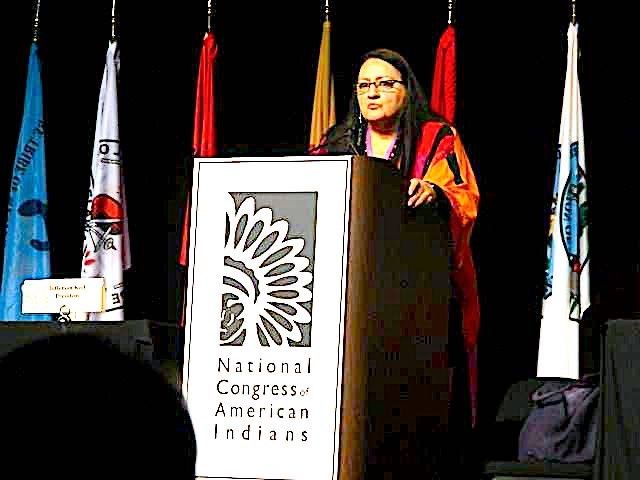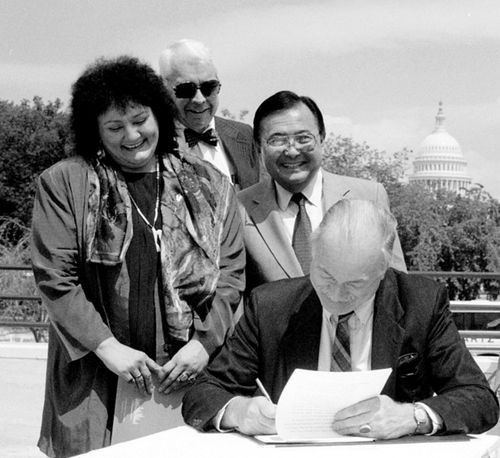NATIONAL MUSEUM OF THE AMERICAN INDIAN
Women’s History Month featuring Native Rights Champion Suzan Shown Harjo
“She’s taught all of us that Native values make Americans stronger.” - President Barack Obama
:focal(316x241:317x242)/https://tf-cmsv2-smithsonianmag-media.s3.amazonaws.com/filer_public/00/73/0073e27c-cf17-4327-9d20-607dc8ad3482/suzan_harjo_1.jpg)
Suzan Shown Harjo has helped shape current ideas about cultural representation and respect. In Congress and the courts, she has advocated for reforms from the restoration of Native American religious freedom to the protection of sacred lands. And she has held the Smithsonian and other museums to higher standards in collaborating with Native Peoples and their cultural patrimony.
Suzan Shown Harjo (Cheyenne and Hodulgee Muscogee), an enrolled citizen of the Cheyenne and Arapaho Tribes, was born on June 2, 1945, in El Reno, Oklahoma. Her mother’s great-grandfather, Chief Bull Bear, was both a ceremonial leader and a leader of the Cheyenne Dog Men Society, an institution with roots in Cheyenne warrior traditions. Suzan's father was a career soldier, a veteran of World War II, who fought from North Africa to Monte Cassino. Suzan and her younger twin brothers grew up in Oklahoma with grandparents and at their parents’ Army post in Oahu, Hawai'i, and NATO post in Naples, Italy. A mother and grandmother, she has lived in New York City, Santa Fe, and Washington, DC.
Harjo’s list of achievements is long and distinguished. In the late 1960s and early 1970s at WBAI-FM Radio in New York City, she and her husband, Frank Ray Harjo (Wotko Muscogee), co-produced Native programs, including Seeing Red, the first national Native news show. She was responsible for one-third of the station’s airtime and was the first woman to direct WBAI’s Drama and Literature Department. In the mid-1970s, she became news director for the American Indian Press Association, in Washington, D.C. She served as a special assistant for American Indian legislation during the Carter administration and was the principal author of the President’s Report to Congress on American Indian Religious Freedom./https://tf-cmsv2-smithsonianmag-media.s3.amazonaws.com/filer_public/ac/38/ac38356d-475c-4a7b-a9f6-ace28b962d62/suzan_harjo_3.jpg)
In 1984, friends of the Harjo family founded the Morning Star Institute in her husband’s memory and installed Suzan Harjo as its founding president to promote and protect sacred lands, traditional and cultural rights, artistic expression, and ethical research. The National Day of Prayer to Protect Native Sacred Places, first organized by the institute on the 2003 summer solstice, has grown to be a multi-day event observed at sacred and secular sites around the United States.
Harjo served as executive director of the National Congress of American Indians from 1984 through 1989, leading campaigns against anti-Indian/anti-treaty hate groups and for Native treaty rights, tribal sovereignty, heritage languages, repatriation, and the establishment of the National Museum of the American Indian. Morning Star funded NCAI’s cultural rights agenda and campaigns during her tenure as executive director. She was honored with NCAI’s 2015 Native Leadership Award.
In 1992, she was one of seven Native people who filed the landmark lawsuit Harjo et al v. Pro Football, Inc., to cancel federal trademark protections for the name of the Washington, D.C., football team (1992-2009). She organized an identical suit and recruited Native young people to file it, Blackhorse et al. v. Pro Football, Inc. (active, 2010-2017); co-drafted legislation in the House co-sponsored by numerous representatives to achieve the same goal as the litigation; and a 2013 NMAI Symposium on Racist Stereotypes in American Sports.
On November 24, 2014, President Barack Obama acknowledged Harjo’s lifework with the Presidential Medal of Freedom, the United States’ highest civilian honor, saying, “She’s taught all of us that Native values make Americans stronger.” Calling her “one of the most effective advocates for Native American rights,” he said she has “fought all her life for human, civil, and treaty rights of Native peoples…With bold resolve, Suzan Shown Harjo pushes us to always seek justice in our time.”
In 1967, Harjo was part of the alliance that envisioned the National Museum of the American Indian and the return of Native Ancestors. She wrote about that 20-year journey in It Began with a Vision in a Sacred Place (in Past, Present and Future Challenges of NMAI, 2011). In 1984, she initiated talks with the Secretary of the Smithsonian, Robert McCormick Adams. Long concerned with the proper care, treatment, and display of Native objects, and the return of human remains and other sacred items held by museums, she served as a trustee of the Museum of the American Indian–Heye Foundation in New York City, the NMAI’s predecessor museum collection (1980-1990).
The 1989 NMAI law, which she co-drafted, includes the historic federal repatriation provisions. The Native American Graves Protection and Repatriation Act followed eleven months later. Harjo was the principal author of the new museum’s trustees’ policies on repatriation, identity, and exhibitions, and helped to draft its bylaws and collections policy. She also chaired its inaugural public programs committee and served on the search and selection committees for the museum’s director and architect.
In 1992 Harjo curated the first exhibition of artwork by contemporary Native artists ever shown in the U.S. House and Senate rotundas, Visions from Native America. In 2003, she and Vine Deloria, Jr., Esq. (Standing Rock Sioux; 1933-2005) began work with expert treaty advisors to plan and organize the first exhibition anywhere to tell the story of U.S.-Native Nations’ treaties. After Deloria’s passing, she continued to curate the exhibition and edit the book that accompanies it through the opening and publication in 2014. Both titled, Nation to Nation: Treaties Between the United States and American Indian Nations, the major, award-winning history exhibition is on view until January 17, 2028 at the NMAI’s museum on the National Mall.
Suzan Harjo is one of eight Native women honored on Winyan Wánakikśin (Women Defenders of Others), a carved, inlaid buffalo horn belt created by artists Kevin Pourier (Oglala Lakota) and Valerie Morgan (Oglala Lakota), on view in the museum’s Potomac Atrium. Harjo hosted the first three seasons of NMAI’s Native Writers Series and directed its Native Language Repository Project. Her poetry has been published and anthologized widely and was the inspiration for Blood of the Sun: Artists Respond to the Poetry of Suzan Shown Harjo (2011), curated by America Meredith (Cherokee Nation) in Santa Fe. She was the first person to receive back-to-back residency fellowships by the School for Advanced Research (2004 Poetry Fellow and Summer Scholar).
“Dr. Harjo’s achievements for the Institute of American Indian Arts (IAIA) and the National Museum of the American Indian are lasting features of our institutions,” Patsy Phillips (Cherokee Nation), director of IAIA’s Museum of Contemporary Native Arts, observes. “Her contributions to arts and letters, activism and laws, and institution-building are the reason she is so widely recognized and awarded, including by IAIA (2011), whose Honorary Doctorate in Humanities she earned with a lifetime of realized ideas and hard work.”
/https://tf-cmsv2-smithsonianmag-media.s3.amazonaws.com/filer_public/98/08/98087e1d-4322-4c5f-8a30-9894e63450e1/suzan_harjo_5.jpg)
In 2023, she received an Honorary Doctorate of Humane Letters from Princeton University, whose citation began with this: A tireless advocate at the center of almost every Native American legislative, legal, and cultural issue over the past half-century, her work has led to the protection of rights, cultures, and sacred places, and the return of more than one million acres of Indigenous lands. She is an activist, poet, journalist, curator, playwright, and more—and the force behind the decades-long movements to Indigenize Native place names and to remove sports team names and mascots that stereotype or disparage Native Peoples, from high schools to the National Football League.
Selected for an Oklahoma Journalists Hall of Fame’s Lifetime Achievement Award (2024), she was inducted into the National Native American Hall of Fame for her work in advocacy (2022). The first Native woman Montgomery Fellow (Dartmouth, 1992), she was the first Native woman elected to both of the two oldest learned societies in the U.S., the American Academy of Arts and Sciences, 1780 (2020), and the American Philosophical Society, 1743 (2022).
